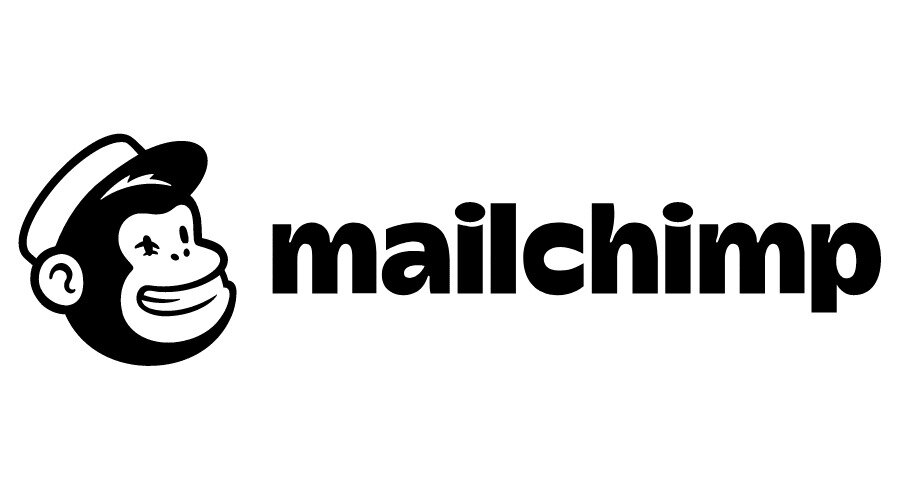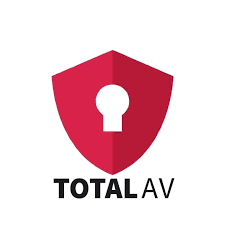Privacy Canada is community-supported. We may earn a commission when make a purchase through one of our links. Learn more.
VPN Scams to Avoid (Updated)
VPN technology isn’t new. For decades, businesses and individuals have used it to protect sensitive data and to keep their online movements anonymous. Some people consider it a matter of privacy. They just don’t like the idea of anyone, like their ISP or a hacker, being able to track their web traffic.
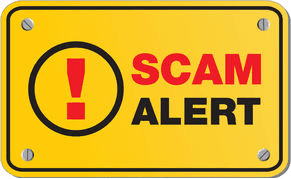
For other people, using a VPN is a matter of life or death. They are citizens and journalists living within totalitarian regimes that do not allow the free expression of thoughts and opinions. A VPN allows them to take subversive positions and revolutionary actions without risking their life, or quite literally, their limb.
Consider the steps that you might take to secure your home against the outside world. Security cameras on the home’s exterior will alert you to possible intruders, but you only want to get the best and the most reputable camera system that you can buy. It’s simply the only way that you can trust that you’re getting your money’s worth from the system.
The same is true for a VPN. The best Canadian VPNs will protect you from all sorts of spying, but an inferior one will leave you vulnerable to attack from all angles. How can you know which VPN to trust? For our French-speaking audience, take a look at Meilleur VPN.
Let’s begin by examining what you gain when you use a VPN before moving into a VPN scams list. Armed with this information, you’ll be able to make an informed decision when it’s time to choose a VPN for your home or your business.
The Advantages of Using a VPN
Did you know that your Internet Service Provider (ISP) can track all of your online activity?
They know when you log on, which websites you visit, what you do while you’re there, and how long you spend there. They can see your social media activity. They can monitor as you participate in a forum; even online shopping habits are no secret to them.
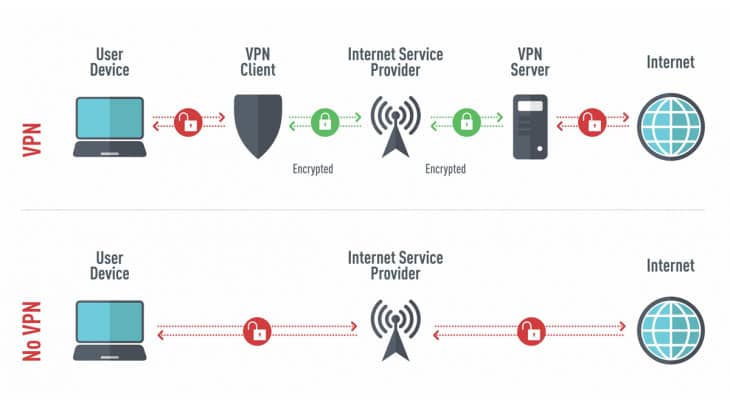
Unfortunately, your ISP isn’t the only party that’s interested in what you’re doing online. Companies, such as retailers and service providers, are tracking your movements, looking for opportunities to sell you something. Then, there are the shady operators. They are the ones who are hoping to infect your system with malware, adware, and other potentially harmful software. They’d really like to get to know you better. Specifically, any of your personal information, including your credit card numbers and bank account numbers, is of particular interest.
A solid, well-reviewed VPN can protect you from all of this. VPN technology wholly masks your IP address, making it impossible to trace. What’s more, your VPN can make it look like you’re browsing from Sydney when you’re actually in Montreal.
Nonetheless, it’s clear that not enough people are taking advantage of all that a VPN can do.
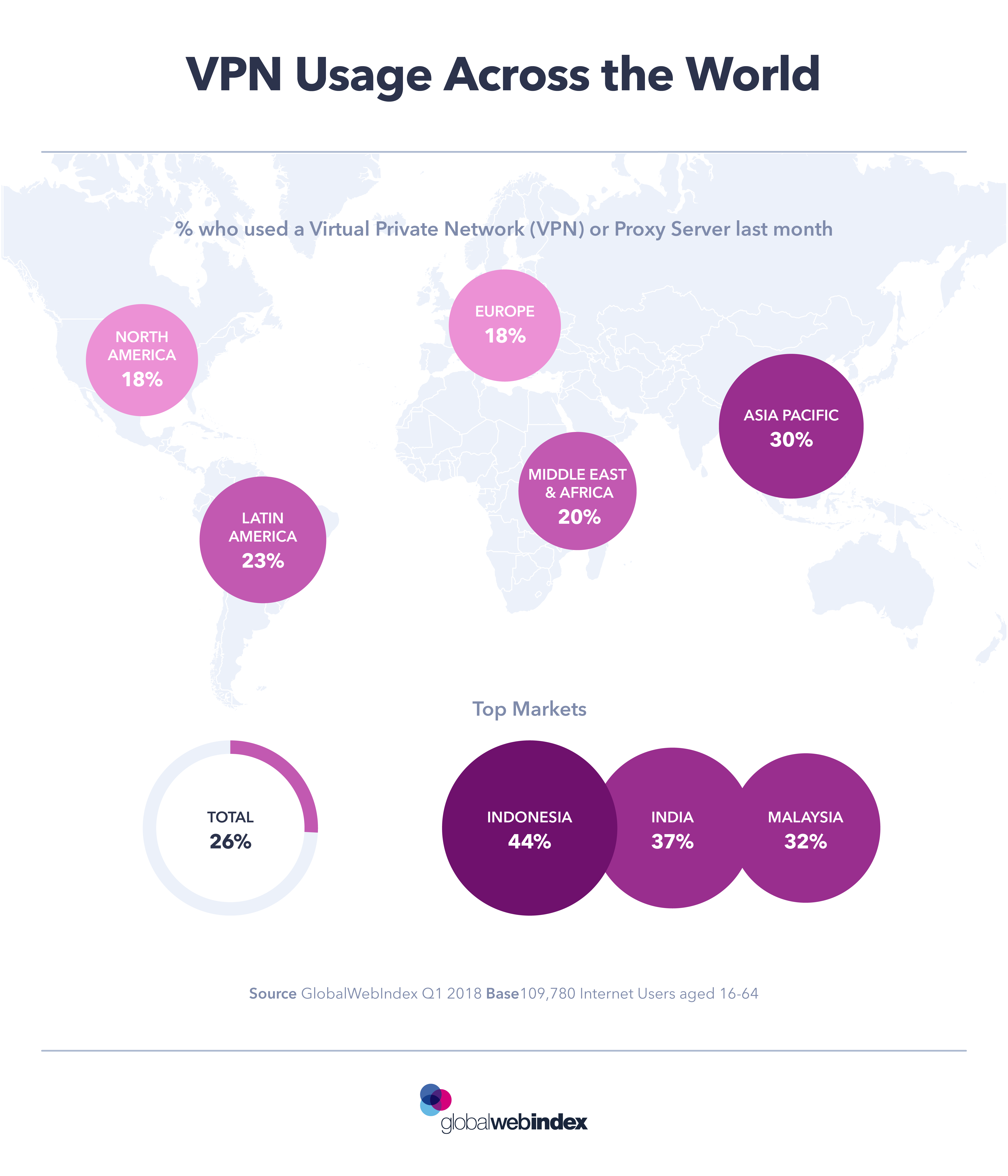
Your VPN encrypts your web traffic and can potentially hop it around to two or three servers across the globe. No one, not even your ISP, can see what you’re doing online. You enjoy total privacy and anonymity as well as the peace of mind of knowing that you are completely safe when you’re online.
It’s kind of like having a top home security system installed at home; you’ll sleep better at night knowing that you and your family are fully protected.
Is It Ever Dangerous to Use a VPN?
For most people, there is no danger associated with using this type of software; understanding VPN basics and carefully selecting a reputable provider with a track record of offering perfect security and anonymity online is key.
Some people may be in danger simply through using any VPN. These individuals live in oppressive countries where VPN use is outlawed because the government wants to monitor all of their online activities
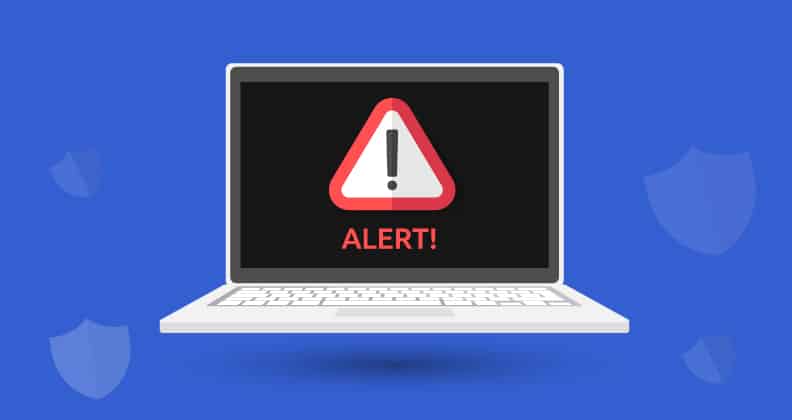
However, this is a different kind of danger from the one that’s being discussed here. It also may be dangerous to use a VPN when it is a fake VPN that does not actually offer the services that it advertises. It may be dangerous when a VPN chooses to infect your system with all sorts of spyware and viruses. They may even track and record your movements online, selling the data to the highest bidder.
Isn’t that the exact opposite of what a VPN is supposed to do?
That’s what is frightening about the dozens of VPN providers that are operating today. Some are highly reputable, striving to offer reliable services that keep you safe online no matter what.
Then, there are the VPNs that take your money but give you nothing in return. Just as bad are the ones that are “free.” You can bet that most free VPNs are offered at that price because you are being sold.
A savvy consumer can avoid these VPN scams. The more you know about the typical ploys used by these nefarious providers, the easier it will be for you to steer clear of them.
Typical VPN Scams to Avoid
The following list of VPN scams isn’t theoretical. Each of these scams has been tried and proven successful through the entrapment of unwary consumers. Don’t let yourself fall victim to any of these cons.
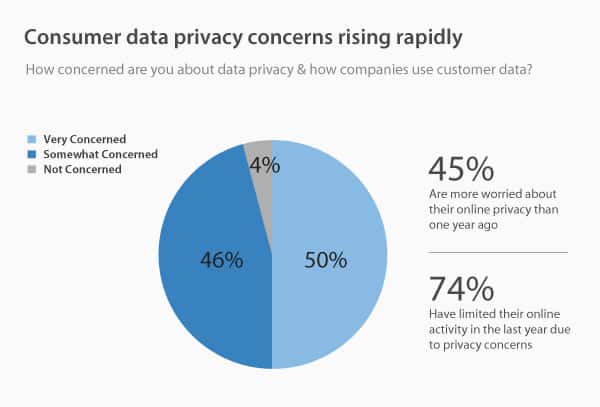
This is critical information because studies show that people are increasingly concerned about online privacy and about how companies are using their data.
No one can afford to put themselves at further risk by ignoring this list of VPN scams.
1. Free VPNs – It Costs You More than You Might Think
Who doesn’t love getting something for nothing? It kind of does makes you feel like you’re getting away with something, doesn’t it? Or so you’d think. But you see, when it comes to best free VPNs, it’s usually the service provider that’s getting away with something.
A handful of reputable VPN providers do offer a free version of their services. Typically, these no-cost tiers are quite limited as far as bandwidth, and there aren’t many bells and whistles associated with it. The free version is offered with the hope that you’ll try the service and become a paying customer. If you must choose a free VPN, then avoid what’s on our list below.
Unfortunately, many “free” VPNs could end up costing you a tremendous amount in terms of time, money and headaches. Some of these services restrict you to an outdated VPN protocol like PPTP, which isn’t considered reliable by any security professionals. You won’t get any kind of strong encryption with this protocol, leaving you vulnerable to a world of problems.
Any VPN that is provided at no cost to customers must drive revenue somehow. If they don’t take money from the public, then they must get it elsewhere. With this business model, the profits usually come from selling the browsing habits of their users. Essentially, the VPN shares user data with firms in the marketing world.
Some of these disreputable VPNs will give your email address to business partners or unknown third parties. These other companies can then use your email address for all sorts of nefarious purposes like cryptojacking, ransomware, phishing and sending spam emails.
Still other VPNs will insert things like web beacons, tracking pixels and cookies in your system. This makes it possible for the VPN, and the companies that pay the VPN to insert these trackers, to track your web traffic and use it for advertising purposes.
Just look at this disclosure from the VPN called Betternet:
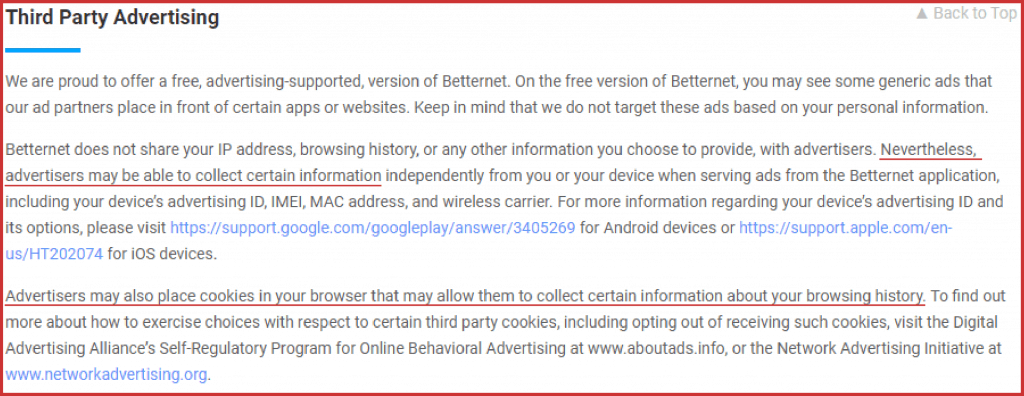
Remember, you get what you pay for. If you want to protect your passwords, then you look for the best password management software you can afford (they’re all pretty cheap). If you want true privacy and anonymity online, then you look for a reasonably priced VPN.
2. Fake VPNs – Claims that are Just too Good to Be True
Some companies advertise themselves as a VPN service, but they don’t actually provide even the basics. Of initial concern is that they frequently don’t bother to encrypt your Internet traffic. This means that everything you do online is exposed to your ISP, third parties, the government and hackers.
In addition, a VPN that’s a fake may inject malware into your system. With this software in place, the VPN is able to use the data they collect from your online habits to send you targeted ads and spam email. They could hijack your accounts, lock up your computer with ransomware or steal your banking information and other private data. It pays to review the dangerous cyber security risks existing today; be on the lookout for any new attack vectors that hackers or bad actors use to infiltrate systems.
When a VPN isn’t genuine, they may make your computer part of a botnet. A “botnet” is a series of devices that are Internet-enabled. Each is infected with malicious software and can be used and controlled by a third party without the owner’s knowledge. This means that the VPN can now sell your bandwidth to any buyers.
A VPN that’s run by crooks may also keep all of your personal data so that they can sell it to someone else.
Wait a minute. Aren’t you using a VPN to prevent your ISP and others from tracking your online movements and selling your info? Don’t fall for a VPN that’s really a con.
3. Lifetime Subscriptions – It’s not Your Lifetime, It’s Theirs
A handful of VPN providers offer a “lifetime” subscription to their services. The cost typically is surprisingly low. When projected over a “lifetime,” it certainly sounds far less expensive than paying for a VPN in one- or two-year increments.
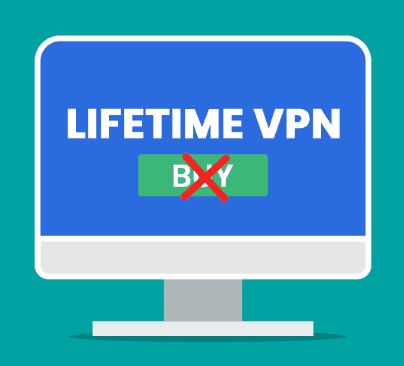
However, many of these lifetime subscriptions just aren’t worth the cost. Untrustworthy VPNs frequently cancel these contracts after just one or two years. Others will collect your data and sell it to advertisers and unknown third parties.
Sometimes, people who sign up for a lifetime subscription find that they are bombarded with ads whenever they go online. Moreover, they frequently are redirected to third-party websites that they don’t want to visit.
Keep in mind that a VPN promising a lifetime subscription is likely referring to their company’s lifetime, not yours. Some of these nefarious VPNs exist only for a couple of years, collecting as many subscriptions as they can before disappearing into the night.
View all lifetime offerings with a grain of salt.
4. Five, Nine and 14 Eyes Surveillance – The UKUSA Agreement
You may have heard of the international surveillance alliances known as the Five Eyes, the Nine Eyes and the 14 Eyes on the news. Essentially, the member nations of these alliances have agreed to work in concert to amass and share surveillance data. It’s a bit like having a global spy agency looking over your shoulder every time you log onto the Internet.

When a VPN is headquartered in a country that is a part of one of these alliances, then it is reasonable to assume that anything that users do online while using that VPN is going to be subject to government spying. While the Canadian government may be prevented from taking certain spying actions against its own citizens without due process, the same may not be true for the U.S. or Australia. If American or Australian spies get their hands on some interesting data, they’ll share it with the Canadian government. That could put Canadian citizens in hot water.
Basically, VPNs that are located in these jurisdictions may be legally required to record certain logs and to share this information with authorities. It makes sense to choose a VPN that is not headquartered in a 14 Eyes country to ensure a true “no logs” experience.
Infamous VPNs That You Shouldn’t Trust
Certain VPNs have made names for themselves for all of the wrong reasons in recent years. While some have since folded, others continue to operate. Learning about some of these VPNs and the scams that they used may help you to identify other nefarious players in the marketplace. We’d leave you a link to their sites for reference—but they are just terrible 😟. So we’d rather not.
Betternet
With malicious software embedded in the code, tracking libraries and leaks of IP addresses, Betternet certainly does not live up to its name.
Betternet is offered for free. For people who have been paying attention to this article, that is a huge red flag. When customers notice strange things happening on their system after using Betternet, they contact the company for customer support or technical advice, but they don’t receive the assistance they are looking for. That’s because Betternet isn’t really there to provide reliable VPN services. They exist simply to gather your data and sell it to the highest bidder.
Archie VPN
Archie VPN is infamous for its tendency to spread malicious software. Many users have even gotten a virus while using Archie. Once again, this is a purportedly free VPN, and it still appears on the Google PlayStore sometimes. Don’t take a chance if you see it.
CrossVPN
Advertised as a free, unlimited VPN, using this service could cost you big time. It’s known to infect systems with a nasty Trojan in addition to malicious software, viruses and spyware. It’s still possible to download CrossVPN, but it is definitely not recommended.
Flash Free VPN
It calls itself a VPN, but it’s really more like a proxy. In addition, if you sign up for the service, you’ll have to grant Flash some fairly dangerous permissions. Another red flag is the complete absence of a privacy policy or even a website. You definitely won’t save any money by going with this questionable provider.
SuperVPN
On the surface, this seems like a pretty good deal. You get unlimited bandwidth for free. However, this purported VPN wants total access to your phone, going well beyond what it reasonably needs. The ads are incessant on this service too, which is annoying. It’s important to note that this app is flagged as malicious software in numerous jurisdictions.
WiFi Protector VPN
Plagued by accusations of failing to adequately protect the consumers who choose their service, WiFi Protector is a bad gamble. Customers have made accusations of spyware and adware. If you want to keep your online experience anonymous, look elsewhere.
Easy VPN
Easy VPN is a pricey service that doesn’t protect its customers the way that it should. In this VPN scams list, this is one of the worst because it logs cookies. Additionally, its privacy policy is practically incoherent. There’s no reason to trust this provider.
How to Avoid VPN Scams
Finding the right VPN takes some work, but it’s worthwhile. Look for a VPN provider that is highly rated across multiple platforms. Ideally, they have a crystal-clear privacy policy so that you know exactly what information, if any, is being stored.
It’s vital to do some sleuthing to find out where the VPN is headquartered. Get beyond the 14 Eyes countries to ensure that your privacy is fully protected.
Additionally, look for a VPN that is upfront about using top-quality VPN protocols like OpenVPN. That way, you can be certain that your web traffic is being properly encrypted.
It’s also critical that you be willing to pay for a VPN. Maintaining high-quality servers takes money, but you want a VPN that uses great servers. In this game, you get what you pay for.
FAQs
Q: Can you trust a free VPN?
A: Rarely. A free VPN is not offered by a charitable organization. They must make money. This means that you’ll be bombarded by ads and be at risk for having your data and online habits being sold to the highest bidder.
Q: Can a VPN provider see traffic?
A: It’s possible that VPN providers could see your web traffic, but the good ones have no interest in doing so. In fact, they take pains to avoid seeing your online activities.
Unfortunately, nefarious VPN providers not only spy on your web traffic they also infect your computer with viruses and malicious software. Your data gets sold to third parties, and you can never be certain who else might be using your bandwidth. Only use reputable VPNs to ensure that these problems don’t arise. For extra protection, consider browsing using private search engines.
Q: Can VPNs steal data?
A: The reputable providers won’t, but many free or otherwise untrustworthy VPNs will. The people who operate these companies are only out to make a profit, and they don’t mind stealing.
Final Thoughts
If you want to protect yourself online, then it’s essential that you use a reputable VPN service like NordVPN. Unfortunately, nowadays, many VPN providers are more interested in selling your personal data than they are in protecting it.
By identifying the scams on this list, you can avoid them and make a wise decision. Just always remember, if they don’t have a product they can actually make money from, then you probably are the product.
To further protect yourself from suspicious activity online, consider using an antivirus software. Here at Privacy Canada, we have the antivirus market cornered.
Check out the following antivirus articles:



